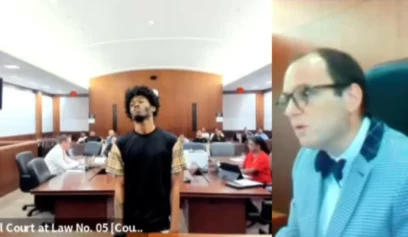A federal appellate court in New York ruled last year that the U.S. government must defend its decision to keep thousands of dollars seized from a Rochester, New York, woman in 2020 as part of a drug investigation involving her former boyfriend, and now the agency that had been keeping her money for more than three years has returned it rather than defend the seizure in court.
On Jan. 23, the Drug Enforcement Administration returned $8,040 to Cristal Starling following a multi-year court fight that ended happily when the agency abandoned its effort to keep the money after the U.S. Court of Appeals for the Second Circuit sided with Starling last August.
“A lot of people are fearful of the law because they don’t know their rights,” Starling said to the Democrat and Chronicle last week. “They don’t educate themselves. They don’t do research.
“Honestly, I’ve been saying this from the beginning. It wasn’t about me. It’s about other people and how these things can continually affect people like me.”
At the time of the seizure, Starling was running a successful mobile food cart business and making an honest living.
Having accumulated a small fortune, her plan was to use the mattress money to purchase a new food truck. This was thwarted when Rochester police raided her apartment in October 2020 and seized the cash as purported drug profits.
No drugs were found during the raid, and the suspect beau was ultimately acquitted by a jury.
But despite his vindication, Starling never received her money back.
She maintained her innocence in numerous government filings but the confiscated funds were still handed over to the DEA, which sought to absorb the loot through a controversial method known as civil asset forfeiture.
After Starling’s money was confiscated, she set out to get the full amount back without a lawyer.
Through the months, she familiarized herself with administrative contacts and procedures, reached out to government agencies, and ultimately filed a claim with the DEA.
However, prosecutors had already filed the forfeiture action in federal court, and to her dismay, Starling missed the deadline to claim the money back, leaving her with no immediate recourse.
Experts say the government commonly uses this complex legal process to seize money and property without having to prove that a criminal act has been committed.
Most cases involve individuals who can’t afford to hire a lawyer or who feel that the money to gain would only be enough to pay off legal fees.
“This is a major nationwide problem, not just that the government seizes too much money under civil forfeiture but that it tries to wriggle out of the remedies that Congress has written to protect victims of forfeiture abuse,” said Paul Sherman, an attorney with the Institute for Justice, which represented Starling in the forfeiture case.
In her appeal, Starling contested the final seizure of her money due to a missed deadline, citing the leniency typically granted in non-forfeiture cases, where courts allow litigants to move forward despite a single missed deadline.
Her lawyers argued that the same leniency should be applied in Starling’s forfeiture case.
Last year, the appeals court agreed and overturned a lower court decision in her case that found she missed the deadline, leading to the earlier dismissal of her case to reclaim the money.
Disputes often get dropped due to missed deadlines, while property owners grapple with extensive paperwork and bureaucratic hurdles that can unravel even the most diligent effort with a single misstep.
The same was true in Starling’s case.
And even as her now-former boyfriend was acquitted in the drug-related case, the DEA pressed forward with the forfeiture claim anyway.
Starling felt cheated.
The case drew immediate condemnation, with legal experts arguing that the current forfeiture system upends the legal concept of innocence until proven guilty, while putting the onus on private individuals who often don’t have the time or means to prove their innocence and reclaim seized property.
The Institute for Justice and Starling are now seeking interest payments for the three years her money was held.


